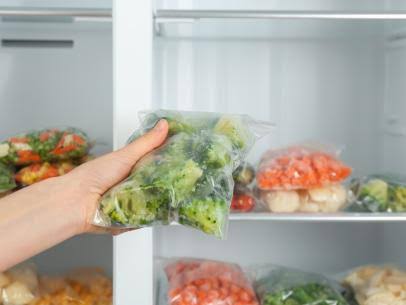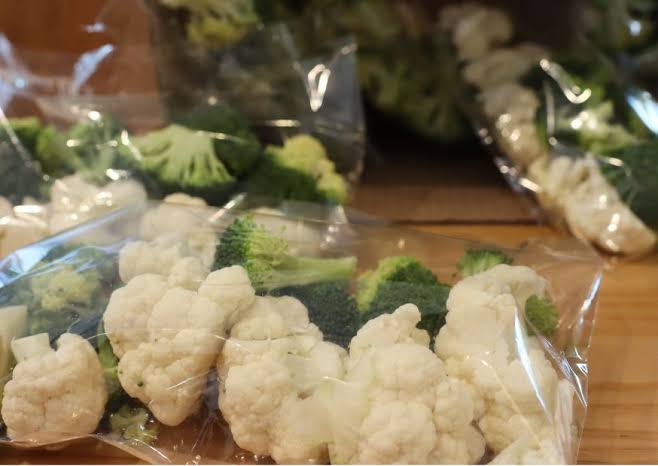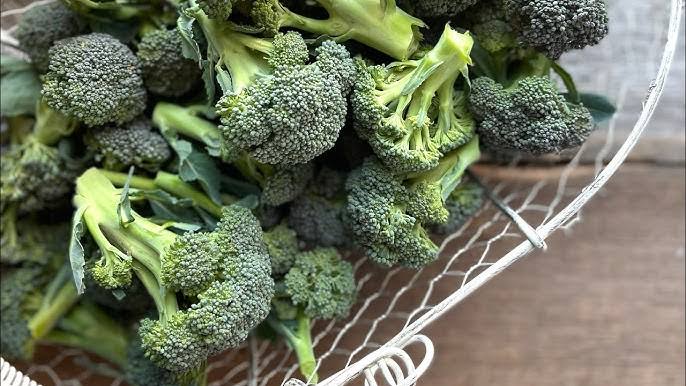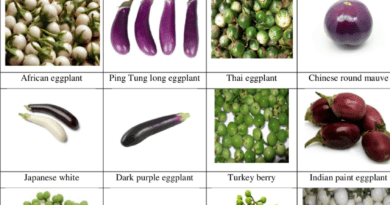How to Store Broccoli and Cauliflower
When it comes to storing or how to store broccoli and cauliflower, it’s essential to keep these vibrant vegetables fresh and crisp for optimal flavor and nutrition. Both broccoli and cauliflower belong to the cruciferous vegetable family, packed with vitamins, minerals, and fiber. Let’s explore the best ways to store these nutritious veggies.
To maintain the freshness of broccoli and cauliflower, store them in the refrigerator. Wrap the vegetables in a damp paper towel and place them in a perforated plastic bag or produce drawer. This helps regulate humidity, preventing the vegetables from drying out.
Avoid washing the broccoli and cauliflower before storing them, as excess moisture can lead to mold and spoilage. Instead, wash them just before use. Keeping the vegetables dry helps prolong their shelf life and preserves their taste and texture.
Additionally, it’s crucial to store broccoli and cauliflower away from fruits that produce ethylene gas, such as apples and bananas. Ethylene can accelerate the ripening process and adversely affect the quality of these cruciferous vegetables.
When storing broccoli, trim any yellowing leaves and cut the stems at an angle. This not only enhances the vegetable’s appearance but also allows for better water absorption when placed in the refrigerator. Cauliflower, on the other hand, should be stored with the stem side down to minimize moisture exposure.
Regularly check the stored broccoli and cauliflower for any signs of spoilage, such as discoloration or a foul odor. Removing any damaged portions promptly helps maintain the overall freshness of the vegetables.
Storing broccoli and cauliflower is a simple yet crucial step to ensure you enjoy these nutrient-rich vegetables at their best. Keep them in the refrigerator, wrapped in a damp paper towel, and away from ethylene-producing fruits. Remember to trim and cut as needed, and always inspect for freshness before use. This way, you can savor the goodness of broccoli and cauliflower in your meals while promoting a healthy lifestyle.
Broccoli, with its vibrant green florets, is not only a culinary delight but also a nutritional powerhouse. Rich in vitamin C, fiber, and antioxidants, broccoli supports a robust immune system and aids in digestion. This versatile vegetable can be enjoyed raw in salads, steamed, or roasted to perfection. Its mild, slightly peppery taste adds a delightful twist to various dishes, making it a favorite in many kitchens.
Cauliflower, the pale cousin of broccoli, offers its unique set of health benefits. Packed with vitamins, minerals, and phytonutrients, cauliflower is known for its anti-inflammatory properties. Its neutral taste allows it to seamlessly adapt to various cooking methods, from being mashed as a low-carb alternative to potatoes to transformed into a flavorful cauliflower rice. This cruciferous gem is not only versatile but also an excellent source of nutrients.
Both broccoli and cauliflower share common traits that make them stand out in the world of vegetables. They are low in calories but high in nutrients, making them an excellent choice for those seeking a nutrient-dense diet. These vegetables contain compounds that have been associated with cancer prevention, making them an essential addition to a health-conscious plate.
Beyond their nutritional benefits, broccoli and cauliflower also lend themselves to creative culinary endeavors. Experiment with different cooking methods, such as grilling, stir-frying, or even making a hearty soup. Their versatility allows you to explore a plethora of recipes, ensuring that you never get bored with these wholesome vegetables.
However, broccoli and cauliflower are not just vegetables; they are culinary delights that offer a myriad of health benefits. From their proper storage to exploring diverse cooking techniques, these cruciferous wonders have rightfully earned their place in the spotlight. So, the next time you reach for these vegetables, savor not just the taste but the goodness they bring to your overall well-being.
Read Also: Ackees: History, Nutrition, Health Benefits and Growing Guide
How to Store Broccoli and Cauliflower

To store broccoli and cauliflower for optimal freshness:
1. Refrigeration is Key: Place both vegetables in the refrigerator. Use the vegetable crisper drawer if available. The cool temperature helps maintain their crisp texture.
2. Avoid Pre-Washing: Refrain from washing broccoli and cauliflower before storage. Excess moisture can lead to mold, so it’s best to wash them just before use.
3. Damp Paper Towel: Wrap the broccoli and cauliflower in a damp paper towel. This helps to keep the vegetables hydrated without making them too wet.
4. Perforated Plastic Bag or Produce Drawer: Place the wrapped vegetables in a perforated plastic bag or the produce drawer of your refrigerator. This helps regulate humidity, preventing them from drying out.
5. Store Separately: Keep broccoli and cauliflower away from fruits that produce ethylene gas, like apples and bananas. Ethylene can accelerate the ripening process and affect the quality of these cruciferous vegetables.
6. Trimming and Cutting: For broccoli, trim any yellowing leaves and cut the stems at an angle. For cauliflower, store it with the stem side down to minimize moisture exposure.
7. Regular Inspection: Periodically check the stored broccoli and cauliflower for any signs of spoilage, such as discoloration or a foul odor. Remove any damaged portions promptly to maintain overall freshness.
These simple steps can helps to ensure that your broccoli and cauliflower stay fresh, crisp, and flavorful for an extended period, ready to be enjoyed in your favorite dishes.
Read Also: Longans: History, Nutrition, Health Benefits and Growing Guide
Why Store Broccoli and Cauliflower

Storing broccoli and cauliflower is essential for several reasons:
1. Preserving Freshness: Storing these vegetables in the refrigerator helps maintain their crisp texture and vibrant colors, ensuring they stay fresh for a more extended period.
2. Preventing Spoilage: Refrigeration, combined with proper wrapping and storage conditions, helps prevent spoilage by minimizing exposure to excess moisture and contaminants.
3. Optimizing Nutrient Retention: Broccoli and cauliflower are rich in essential nutrients like vitamins and antioxidants. Proper storage helps retain these nutrients, ensuring you get the maximum health benefits when consuming them.
4. Minimizing Flavor Loss: Storing broccoli and cauliflower correctly prevents flavor loss. Freshness contributes significantly to the taste of these vegetables, enhancing the overall dining experience.
5. Reducing Food Waste: Proper storage practices help minimize food waste. By extending the shelf life of broccoli and cauliflower, you’re less likely to discard them due to spoilage, contributing to a more sustainable and economical approach to food consumption.
6. Meal Planning and Convenience: Storing these vegetables allows for better meal planning. You can buy them in larger quantities, ensuring you have a versatile and nutritious ingredient readily available for various recipes.
7. Flexibility in Culinary Exploration: Properly stored broccoli and cauliflower provide the flexibility to experiment with different cooking methods and recipes. This culinary exploration enhances your overall dining experience and encourages a diverse and balanced diet.
In summary, storing broccoli and cauliflower is not just a matter of convenience but also a strategic approach to preserving their freshness, nutritional value, and overall quality. It supports healthy eating habits, reduces waste, and opens up possibilities for culinary creativity in your kitchen.
Read Also: Waste To Fertilizer: What You Need to Know









